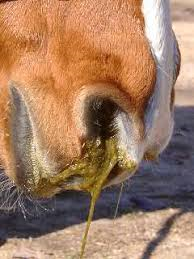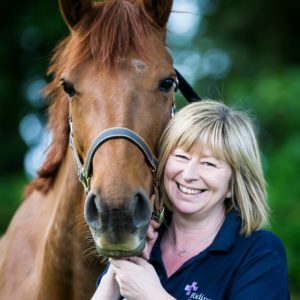What is choke?
Choke is a relatively common condition which occurs when food or a foreign body blocks the horse’s oesophagus. The oesophagus is a food pipe which connects the mouth to the stomach.
Why does it occur?
Choke most commonly occurs as a consequence of the horse consuming food which does not pass easily down the oesophagus. For example, unsoaked sugar beet which swells rapidly in the oesophagus, poorly chewed forage or hard feed, or bulky carrots or apples. Choke can also occur in foals who consume dry or course hay or straw.
Certain diseases or injury can predispose to choke. Grass sickness, botulism, trauma to neck or oesophagus area etc can interfere with the horse’s ability to swallow and therefore increase the risk of choke. We always recommend any horses which have been sedated do not have their food re-introduced until they have fully recovered- this is to prevent them choking.
What are the clinical signs?
Choke can be very distressing to see but please remember your horse is still able to breath. The signs often occur immediately or soon after eating. The following are some clinical signs which may indicate your horse has choke:
- Saliva or food material coming out of the nose and/ or mouth.
- Attempts to swallow and extending neck
- Coughing
- Sweating
- Depression
Choke can be fatal in rare cases where the oesophagus ruptures.
How is it treated?
In most cases the blockage clears on its own so try not to panic. However, if you think your horse has choke we recommend you call. Ensure your horse does not have access to any more food or water- some horses will continue to try and eat!
After fully examining a choking horse we would administer an anti-spasmodic (Buscopan) and sedation. We then usually pass a tube from the horse’s nose, down its oesophagus towards its stomach. If a blockage is present the tube will not be able to advance the full way to the stomach. To help clear the blocked material we administer small amounts of water via the tube. Some obstructions may clear easily, others can take a long time but patience is key to avoid damaging the oesophagus.
What should I feed my horse after it has choked?
We advise feeding sloppy feeds for few days after a horse has had choke as there is likely to be swelling at the site of obstruction and it is possible for them to re-choke. After 2-3 days small volumes of hay or grass can be re-introduced slowly.
Anti-inflammatories are prescribed for a few days after a horse has choked to help reduce any localised inflammation.
Are there any complications?
Unfortunately yes. Rarely, oesophageal rupture can occur as a direct consequence of the obstruction or following attempts to dislodge it. A more common complication is aspiration pneumonia, where food material is inhaled into the lungs and causes an infection which can usually be treated successfully with antibiotics. Horses which have repeated episodes of choke may have an oesophageal stricture. This is a narrowing of the oesophagus due to the associated trauma, inflammation and scar tissue development which can occur following an obstruction.
Can I do anything to prevent choke?
There are a couple of management considerations which may help reduce your risk of choke:
- Routine dental checks to ensure your horse can chew effectively and is not suffering from oral discomfort (please see our dental blog for more information)
- Constant access to clean water
- Feed good quality roughage
- Add water to hard feeds
- Thoroughly soak dried foodstuff such as sugar beet to ensure they do not swell further after they have been eaten
If you have any questions or would like further information please do not hesitate to contact us. If you are concerned your horse is choking please contact us immediately.

